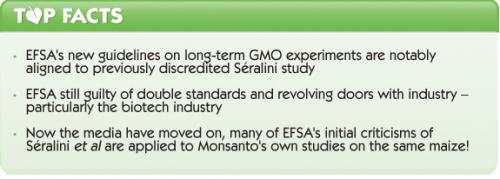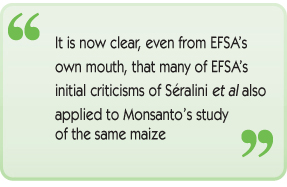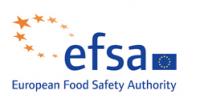In a strange turn of events, the European Food Safety Authority (EFSA) appears to have backtracked on many of the points made in its reviews of the rat feeding study of Monsanto’s Roundup pesticide and NK603 genetically modified (GM) maize, performed by Gilles-Eric Séralini et al. Is this an attempt to accommodate the shortcomings of Monsanto’s own study protocols?

EFSA moves the goalposts
The European Food Safety Authority (EFSA) has published its guidelines for long-term, animal-feeding studies designed to assess the toxicity and carcinogenicity of GM crops. With splendid irony, the new guidelines largely validate the methodology of the Séralini et al study, despite the strong criticisms levelled at the paper by EFSA and others at the time.
EFSA’s new guidelines are published in a Scientific Report entitled Considerations on the applicability of OECD TG 453 to whole food/feed testing. Campaign organisation GM Watch has done a sterling job of comparing EFSA’s new guidelines with aspects of its Séralini et al demolition job. The conclusion? That EFSA now largely agrees with Séralini et al’s methodology –including aspects that EFSA used as justification for rejecting the researchers’ conclusions.
EFSA’s Fake Science Abandoned
Of course, now that the Séralini et al paper has been largely discredited in the eyes of the public, due to the stringent efforts of EFSA and biotech alike, it can afford to be more relaxed – not to mention scientifically honest. Will EFSA now formally retract some of the criticism heaped upon Séralini et al in its reviews? EFSA can’t have it both ways: either Séralini et al were wrong or they weren’t.
More of the same from EFSA
This episode merely confirms that there is something rotten in the state of EFSA. The Authority’s revolving doors with industry, including the GM industry, are well known. Less well known, perhaps, is EFSA’s trust in big biotech’s own safety data. We, along with organisations such as Corporate Europe Observatory and Testbiotech, have frequently challenged EFSA and reported on their industry leanings, topsy-turvy science and other misdemeanours.

Siding with biotech
The Séralini et al study did deserve some criticism, but instead of adopting a responsible precautionary approach or acknowledging the need for further studies, EFSA jumped on the general bandwagon of condemnation emanating from the biotech industry. It is now clear, even from EFSA’s own mouth, that many of EFSA’s initial criticisms of Séralini et al also applied to Monsanto’s study of the same maize, and indeed other GM ‘safety assurance’ studies designed by the biotech industry. It is a scandal that EFSA apparently picks and chooses its scientific stance according to the job in hand: one week keeping its biotech friends happy by dismissing Séralini et al; and then, with the hatchet job complete, quietly admitting that the French group was right all along.
EFSA’s double standards are well summed up by Testbiotech: “[In] failing to challenge the scientific standard of studies which do not show adverse health effects from genetically engineered crops, while at the same time attacking studies that indicate evidence of harm, European Union authorities such as EFSA are applying double standards and follow a biased approach. The authorities seem to be influenced by the presumption that genetically engineered plants should be regarded as safe and seem to be using the debate on scientific standards to defend their own opinions.”








Comments
your voice counts
07 August 2013 at 8:24 pm
EFSA board of directors are sleeping in the same bed with biotech industry along with Monsanto-Dow-Sygenta-Cargill and the other.We have an urgent need to fire the all actual team and redoing the EFSA organisation inmediatly!
27 August 2013 at 5:28 pm
Why are you lying to your readers?
EFSA doesn’t mention the Seralini study in these guidlines and EFSA still consider it ”of insufficient scientific quality to be considered as valid for risk assessment”.
These guidelines doesn't go into the main problem with the Seralini study: (a) his cherry picking of data (from his data you can also draw the conclusion that GMO maize protects against tumors by choosing other animal groups),(b) badly performed statistics or the fact that he only (c)had 20 control animals in a study of 200 animals which EFSA critizised here:
http://www.efsa.europa.eu/en/faqs/faqseralini.htm
30 August 2013 at 5:45 pm
Hi Scientist, we’re not lying to anyone, as a closer reading of the article will make clear. The point we made was that EFSA’s new guidelines now echo Séralini’s methodology, even though EFSA has not retracted any of its criticisms of the Séralini et al paper. We hardly think it likely that EFSA would mention Séralini et al favourably, or at all, in its new guidelines, but the comparison by GMWatch is thorough and conclusive. You can see for yourself here: http://www.gmwatch.org/index.php/news/archive/2013/14882-seralini-validated-by-new-efsa-guidelines-on-long-term-gmo-experiments.
We would also point out that the link you provide does not support your point about the number of control animals. However, the GMWatch article - http://www.gmwatch.org/index.php/news/archive/2013/14882-seralini-validated-by-new-efsa-guidelines-on-long-term-gmo-experiments - has this to say about EFSA’s new guidelines: “5. EFSA recommends against using the extra control or "reference diet" groups commonly included by Monsanto in its 90-day studies and fed a variety of supposedly non-GM diets, on the grounds that the concurrent controls are the valid controls AND what is being tested is the difference between the GM variety and the non-GM comparator. Seralini was criticised by many for not including these spurious extra control groups and for thus having "inadequate controls".”
Your voice counts
We welcome your comments and are very interested in your point of view, but we ask that you keep them relevant to the article, that they be civil and without commercial links. All comments are moderated prior to being published. We reserve the right to edit or not publish comments that we consider abusive or offensive.
There is extra content here from a third party provider. You will be unable to see this content unless you agree to allow Content Cookies. Cookie Preferences